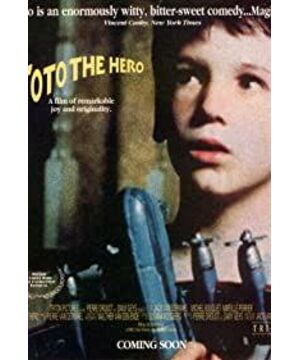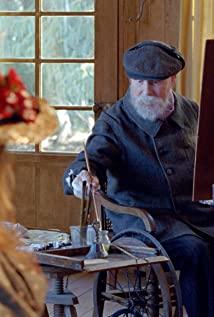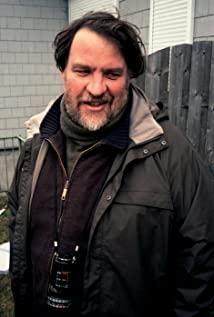The Belgian director Jacques van Dommel's film "Hero Tao Tao" is full of fantastic ideas. On the one hand, he continued the humanitarian traditions of famous film directors such as Jean Renoir and François Truffau; on the other hand, with his very personal style, he revealed his perception of life.
This is a rigorously structured, sentimental, black humor film with mixed sadness and joy.
"Hero Tao Tao" shows a legend full of joy and bizarre fantasy of an old man at dusk. The film runs through the protagonist’s narrative throughout. Thomas looks back on his life, not to tell the audience a real personal revenge story, but to show a person’s dream from childhood, youth, adulthood to old age. An illusory emotional journey, even the feeling of life and death. This kind of retrospect is not only to explain the long process of life, but to give it the meaning of thought.
The film shows the most memorable and unforgettable events at all stages of Thomas's life, not in the form of chronicles, but in a rushing and irrational way of purely personal feelings, to show the audience in a leap. It very cleverly weaves the reality and the past, reality, memories, and even fantasy events in completely different movie time and space. From the perspective of ordinary movie “storytelling”, this method seems messy, or even fragmented, but judging from the human’s emotional journey, the movie is also orderly. It removes the audience from the outside in a cinematic way. The interest of the event leads to the profound ideological connotation that the film wants to reveal. Van Dommel made a story that resembles a modern novel (this story also has a lot of psychological description and conscious processes), which is very characteristic of the film.
The structure of the film is based on Thomas' emotional fulcrum. His pain stems from his fantasy, and at the same time he hopes to use fantasy to alleviate this pain, but he is even more trapped in a vicious circle of emotions. His pain came from his neighbor, Alfred, who believed that it was this man who was born on the same day and the same year as him who robbed him of the wealth, love and happiness that should have belonged to him.
Has that fire really happened in the maternity hospital? Does the baby have any memory? Did Thomas really switch identities with Alfred? And did Alice really die in a fire? ...... This series of questions appears specious in the film, and no definitive answer has been given. For example, there was indeed a fire in the video, and there was indeed a baby exchange, but the mother's answer was "there has never been a fire in the maternity hospital." So, is it the mother's lie or Thomas' own illusion? This attracts the audience to walk forward. The same is true for Alice. Did she really die in the fire? Is the Evelina who looked exactly like her Alice who concealed her past history? These issues are also ambiguous in the film. It was only at the end of the film that the audience realized that all these questions seemed meaningless. This series of questions is designed to affect the emotions of the audience and quietly lead to a more important proposition. When Thomas discovered that Alfred, the man he admired and hated all his life, had the same pain and misfortune, the same emotional loss and loneliness of life. What surprised Thomas even more was that Alfred at this time envied his simple, free, unfettered, "you can do whatever you want" ordinary life. So the money, wealth, reputation and status in the worldly concepts suddenly became so small and insignificant. The director and the actors handled this shocking conversation so plainly, showing the depth of their understanding of life. It was this conversation that made Thomas deeply aware of his narrowness and finally took the final decisive step. The ending seems to be back to the original point. The protagonist realizes his desire to reverse his identity, but the character's ideological realm has been sublimated.
An almost absurd story was compiled so sensibly and reasonably, which shows the director's profound skill in mastering film techniques. Van Dommel admitted, "It is not easy to write a good script or make a good film." He spent ten years on the production of this film, and only the script was changed at least eight times. The Belgian director who is proficient in French, English, German, and Dutch said: "I think I am a director who does not belong anywhere. Because in Europe, they told me:'Oh, your work has such a visual style, so It’s American.” In the US, they said, “Oh, you’re so unusual and European.” I think I’m a Belgian director. It’s a country where many languages are mixed, and they don’t have their own identity. It’s a strange mixture of different cultures."
The film "Hero Tao Tao" does have an "American flavor" in its visual storytelling method. It has a story that is very appealing to the audience, with stimulating content of love and assassination. At the same time, in terms of the style and unique personality of the work, the depth of thought of the characters, and the unique interpretation of the author, it is very personal, and it can be said that it is "Europeanized". It is a mixture of many cultures, which is also the style of Van Domeer.
The film does not use the protagonist's "storytelling" method, it makes full use of the film's unique audio-visual means to allow the audience and the protagonist to enter the experience together in a superimposed manner. At this time, the language was pale and weak. Van Dommel often deliberately leads the audience astray when using audiovisual elements. This aspect is consistent with the black humor style, but more importantly, it allows the audience to get rid of the habit of "listening to stories" and start this emotional journey with the protagonist. .
In Thomas’s childhood life, the lens basically selects the child’s perspective, and its content is also full of innocence. Among them, the father descends from the sky and the flowers in the garden dance with the rhythm of singing, which well express the romantic sentiment of the children’s world.
The director consciously made Evelina and Alice look very similar in appearance, figure, temperament, dress style and color, and even the violin they carried in their hands. Some of the scenes, prop layouts and dialogues also tried to make "reality" and "past" "Echoes. The director induces the audience to enter the association through visual factors. Make the audience connect Alice and Evelina, and even convince them that Alice and Evelina are just the same person with different names.
This concern for the fate of the characters becomes an important emotional clue in the film.
Another clue is the hunt for Alfred by the killer group, which advances in parallel with Thomas' revenge. Thomas wants to realize his revenge before the killer, and this alone is enough to express the unique personality of the character. Until the end, Thomas’ sudden turn immediately cuts into the implied theme of the film: Humanism finally overcomes personal cravings. The inner emotional clues and the outer assassination clues intersect here, seamlessly combining seemingly accidental events with the inevitable actions of the characters.
Van Dommel's ability to express a very simple plot story so complicated and full of suspense completely relies on the carefully set sound and picture effects. The murders at the beginning of the film and the murdered corpses that are often inserted in the film never show the face of the deceased. Thomas’ voice-over always guides the audience to connect the deceased and Alfred, and repeatedly emphasized, “No one would have thought , I killed him". It was not until the end of the film that the audience discovered the artistic charm of this structure. It was not only a mockery of the audience by the director, but also a mockery of his own destiny by the protagonist Thomas. Both kinds of mockery are full of bitterness, but also full of kindness. It conveys the true meaning of life in a relaxed way.
View more about Toto le héros reviews











